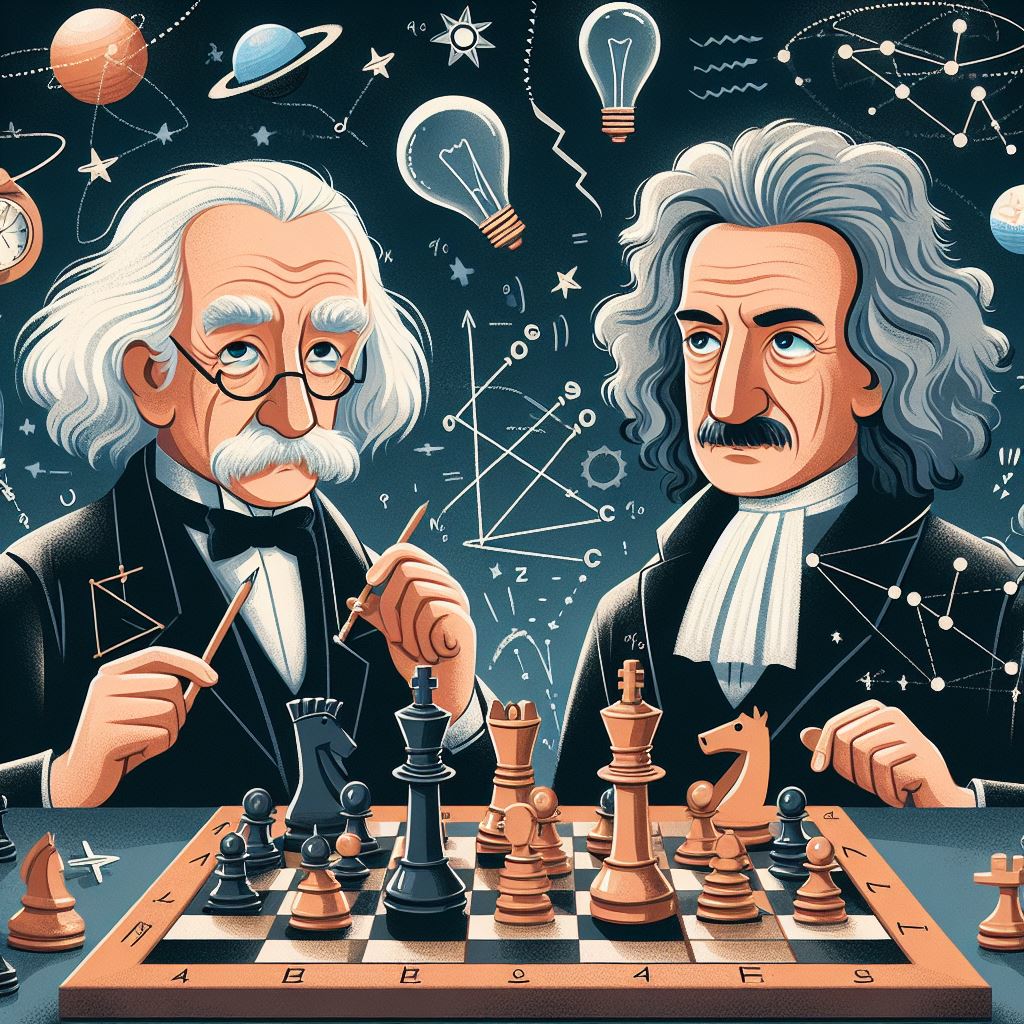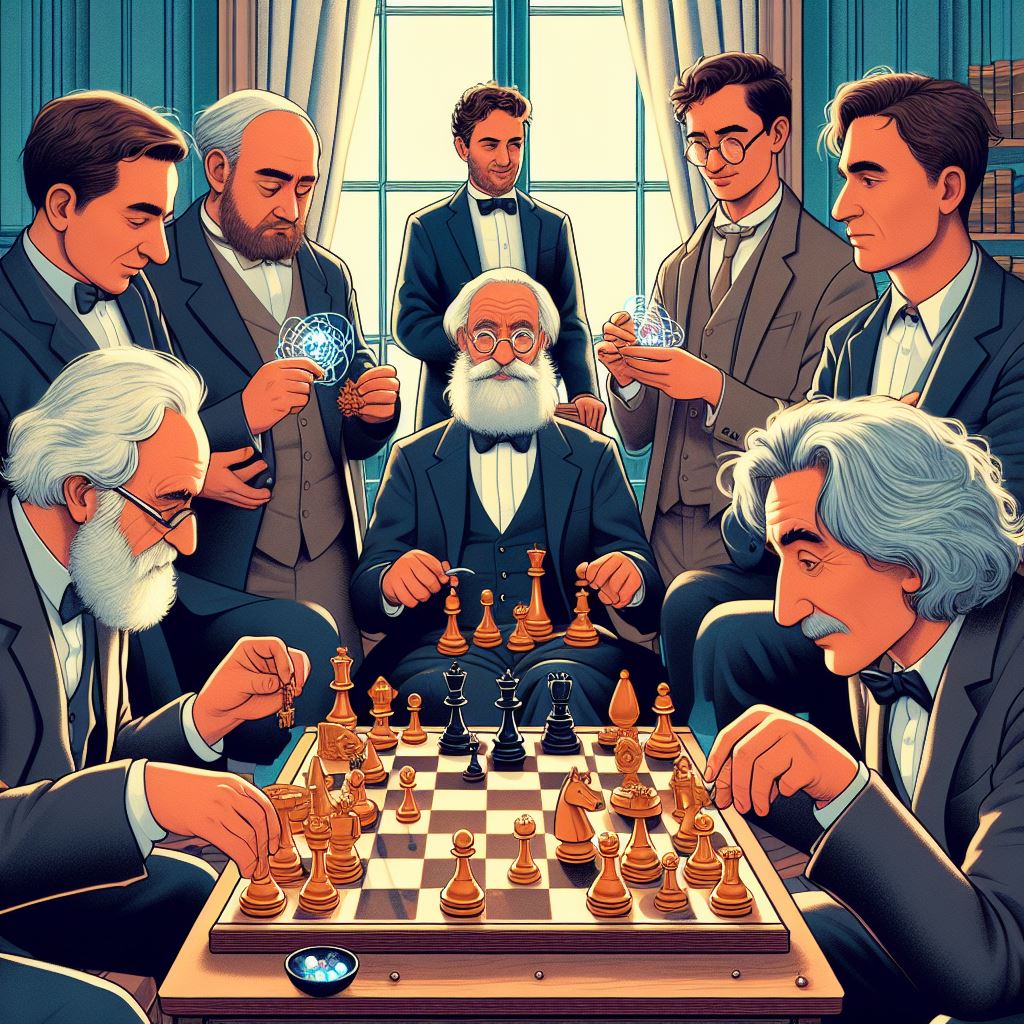For centuries, brilliant minds have been captivated by chess... Few people realise how closely linked the worlds of chess and scientific innovation are. Consider this: over 20 Nobel laureates in physics, chemistry, medicine, and economics were chess players [1]. That corresponds to nearly a tenth of all Nobel laureates in those fields. This intriguing correlation suggests that the game's analytical requirements may improve the skills required for high-level research.

Let us look at some of the physics greats who were chess fans:
Albert Einstein, the father of relativity, was a lifelong chess player who began playing as a child. After immigrating to the United States, Einstein spoke of playing chess with neighbours for fun in Princeton, New Jersey. Eduard Einstein, his second son, even attained the rank of Master from the Swiss Chess Federation.
J. Robert Oppenheimer, the renowned physicist who led the Manhattan Project in developing the first nuclear weapons, was also an avid amateur chess player. Grandmaster Reuben Fine claims to have played chess with Einstein on several occasions during their careers. Despite not being a formal match, their games demonstrated an equal level of skill, with wins and losses shared by the two geniuses [2].
In addition to Einstein and Oppenheimer, a surprising number of prominent twentieth-century physicists appear to be drawn to chess. Enrico Fermi, the inventor of the first nuclear reactor and a Nobel Prize winner, was an avid chess player throughout his life. Contemporaries describe his chess obsession, which included facing multiple opponents at once [6].
Famous physicist Richard Feynman used chess analogies in his lectures to explain complex problems in particle physics. Feynman's personal papers also show that he was a member of his high school chess club and competed in college chess tournaments.
Wolfgang Pauli, the Nobel Prize-winning physicist who is credited with discovering the Exclusion Principle, which prohibits the existence of duplicate quantum particles, was also an avid chess player. According to contemporary colleagues, Pauli routinely defeated visiting physicists at the Institute for Advanced Studies in chess matches. Hans Bethe, a fellow physicist, claimed to have seen Pauli easily defeat opponents regardless of handicaps or odds offered to challengers.
Paul Dirac, the Nobel Prize-winning quantum physicist, taught himself to play chess and regularly played with his colleagues while developing early quantum mechanical theories. Dirac was apparently quite skilled, as people describe him defeating students while playing multiple opponents blindfolded at the Cambridge chess club he later led [4].
Erwin Schrödinger, the Nobel-winning creator of the famous quantum "Schrödinger's Cat" thought experiment, played chess avidly early in life. He mentioned chess specifically as an enjoyable hobby that unfortunately later failed to relax him sufficiently during intense periods of physics research.
Stephen Hawking took his lifelong passion for chess to an expert level, reportedly with an Elo rating of over 2000. Despite being confined to a wheelchair and using a computerised voice communicator, Hawking regularly defeated visitors, including distinguished physicists, in speed chess matches.
Carl Friedrich Gauss, the early 19th-century mathematician and astronomer widely credited with launching the era of modern physics, began playing chess as a teenager. Gauss became obsessed with meticulously recording detailed notes of his chess games and variations, foreshadowing the meticulous laboratory notes that highlighted his long and influential career analysing magnetism, geodesy, and gravitational forces.
Max Planck, the Nobel Prize winner credited with creating quantum theory, enjoyed playing chess with fellow legendary physicist Albert Einstein. According to people, Planck lost most of his games with his younger colleague, but their games had a direct impact on debates about uncertainty principles and photon emissions, which are central to quantum leaps in modern physics [5].

So, what is it about chess that attracts brilliant scientific minds? Parallels are most likely drawn from the detailed strategy required by chess, which is similar to following the scientific method itself. Both fields necessitate the formulation of hypotheses, the prediction of alternative scenarios, and the pursuit of understanding complex, ever-changing systems. This mental rigour and ability to calculate shifting variables are essential for success in both chess and physics research.
The sheer complexity of the game, with more possible board configurations than atoms in the observable universe, is what truly makes chess attractive for mathematical prodigies. Consider the numbers: there are over 9 million possible moves just from the starting position. There are 549 billion game variations after each player's first turn. By the fourth move, the number of possible games has increased to 288 billion, which is more than the number of stars in our galaxy [7].
This exponential explosion continues until the total number of theoretically possible chess games exceeds 10^120. That's a thousand times greater than the number of subatomic particles scientists estimate exist in the cosmos. In practical gameplay terms, it means two chess players with perfect memories could play a hundred billion times over a trillion years...and would still be unlikely to duplicate a single game [8]. Even the most powerful human minds quickly reach cognitive overload when confronted with this hyper-complex and ever-branching decision tree.
Consider the remarkable information processing and memory abilities unlocked by years of practicing these analytical gymnastics with chess masters. Chess experts can recall random chess board layouts with 20 pieces or more after only a few seconds of viewing, whereas novices only retain three pieces [9]. Chess grandmasters can also identify powerful moves and game advantages that have been mathematically proven but are completely unknown to human strategists, thanks to intuitive pattern recognition developed over tens of thousands of matches [10].
Chess players, like scientists, essentially conduct experiments, internally visualising infinite combinations before deciding on their next move as the ultimate mental battle unfolds. This combination of supreme problem-solving rigour and minimal physical demands explains why cerebral endeavours like chess entice scientific intellects who are already professionally immersed in hypothetical thought experiments, almost as a natural mirror of their daily work.
Some argue that games provide a release valve for scientists who are actively experimenting in the laboratory. Swiss chemist Georges Urbain once said, "Chess relaxes my mind between working hours" [3]. Chess provides the ideal mental balance between stimulation and enjoyment for science luminaries when it comes to unwinding minds or even sparking theoretical breakthroughs. The chemistry lab and chess board both provide intellectual rewards while allowing concentration on two very different types of experimentation and imagination.
Cutting-edge physics continues to grapple with cosmic mysteries in the twenty-first century, while chess masters use new AI analytics to gain competitive advantages. And this shared interest in science and chess continues to light up neural pathways between the two fields. But, as chess software advances to superhuman levels, will the game continue to captivate the world's sharpest human minds in the same way that historical figures have for generations?
References:
[1] http://billwall.phpwebhosting.com/articles/Physicists.htm
[2] “The Bright Side of Chess” by Irving Chernev
[3] https://en.chessbase.com/post/top-10-chess-playing-scientists
[4] "Paul Dirac: The Man and His Work" by Abraham Pais [9] From attached text [10] "Stephen Hawking: His Life and Work" by Kitty Ferguson
[5] "Quantum Generations: A History of Physics in the Twentieth Century" by Helge Kragh
[6] “Enrico Fermi: The Obedient Genius” by Gino Segre and Bettina Hoerlin
[7] https://www.chess.com/article/view/how-many-possible-chess-games-are-there
[8] https://www.livescience.com/65247-are-there-infinite-chess-games.html
[9] https://link.springer.com/article/10.3758/s13421-014-0448-8
[10] https://hbr.org/2006/04/the-making-of-an-expert
[11] "Gauss: Titan of Science" by G. Waldo Dunnington